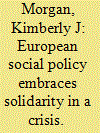|
|
|
Sort Order |
|
|
|
Items / Page
|
|
|
|
|
|
|
| Srl | Item |
| 1 |
ID:
185632


|
|
|
|
|
| Summary/Abstract |
Governments in Europe responded to the COVID-19 pandemic by expanding their welfare systems to protect health, jobs, and incomes. The varied initiatives embody the principle of solidarity and demonstrate how welfare programs serve as a form of collective insurance against risk. But the twin health and economic crises also exposed gaps in coverage for many, including migrants and gig economy workers. Fiscal austerity, enforced by the European Union, has long constrained efforts to close those gaps.
|
|
|
|
|
|
|
|
|
|
|
|
|
|
|
|
| 2 |
ID:
115708


|
|
|
|
|
| Publication |
2012.
|
| Summary/Abstract |
What explains Germany's exceptional labor market performance during the Great Recession of 2008-09? Contrary to accounts that emphasize employment protection legislation or government policy (i.e., short-time work), this article argues that actions by firms-embedded in ever-changing coordinative institutional structures-were crucial. Firms chose to keep rather than shed labor, a strategy induced by (i) a "toolkit" of flexible labor market instruments that had evolved incrementally over the past thirty years; (ii) wage restraint and successful internal restructuring of firms during the past decade, which fueled an export boom before the crisis. Firms thus had some margin for maneuver, using internal flexibility to protect their investment in skilled workers. These and other institutional changes driven by firms reflect a process of successful adaptation to external economic challenges, but did not fundamentally undermine Germany's coordinated form of capitalism. The result is not a new German model that was purposefully designed; instead German firms slowly discovered new ways to cope with economic challenges.
|
|
|
|
|
|
|
|
|
|
|
|
|
|
|
|
| 3 |
ID:
119687


|
|
|
|
|
| Publication |
2013.
|
| Summary/Abstract |
What explains the surprising growth of work-family policies in several West European countries? Much research on the welfare state emphasizes its institutional stickiness and immunity to major change. Yet, over the past two decades, governments in Germany, the Netherlands, and the United Kingdom have introduced important reforms to their welfare regimes, enacting paid leave schemes, expanded rights to part-time work, and greater investments in child care. A comparison of these countries reveals a similar sequence of political and policy change. Faced with growing electoral instability and the decline of core constituencies, party leaders sought to attract dealigning voter groups, such as women. This led them to introduce feminizing reforms of their party structures and adopt policies to support mothers' employment. In all three cases, women working within the parties played an important role in hatching or lobbying for these reforms. After comparing three countries that moved in a path-shifting direction, this article engages in a brief traveling exercise, examining whether a similar set of dynamics are lacking in two countries-Austria and Italy-that have moved more slowly in reforming these policies. Against the prevailing scholarly literature that emphasizes path dependence and slow-moving change, this article reveals the continued power of electoral politics in shaping redistributive policies.
|
|
|
|
|
|
|
|
|
|
|
|
|
|
|
|
|
|
|
|
|